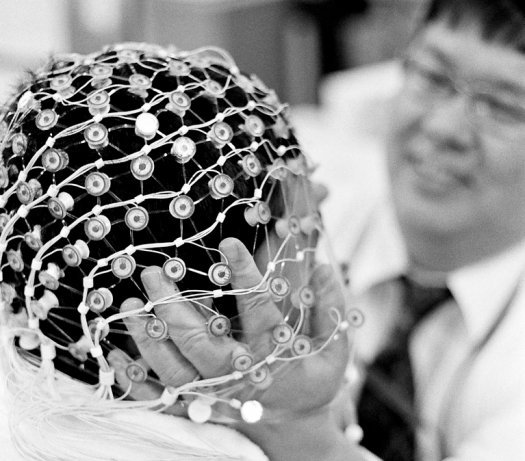From “Zapped,” Mary HK Choi’s Aeon article about her experimentation with Transcranial Direct-Current Stimulation, which may be a performance enhancer:
“The godfathers of modern TDCS are Dr Michael A Nitsche and Dr Walter Paulus from the department of clinical neurophysiology at the University of Göttingen in Germany. In the year 2000, Nitsche and Paulus published an article in The Journal of Physiology, which described how TDCS alters excitability in different regions of the brain by up to 40 per cent. In the brain, excitability affects synaptic plasticity, which means that the neural pathways that determine the capacity for memory and learning are changing substantially, depending on where you’re zapping. There are various electrode montages, each correlating to what we understand about regions in the brain. If you want to stimulate the language centre, you place your anode and cathode on different parts of your head than if you’re interested in reducing epileptic seizures. It seems straightforward but it’s actually mysterious. For example, stimulating the dorsolateral prefrontal cortex influences memory but also helps you quit smoking.
Most of the recent internet write-ups on TDCS have been about the ‘foc.us,’ a TDCS headset that claims to ‘overclock’ your brain and make you better at video games. Priced at $249, the unit comes in two colours (red and black) with a fancy zippered carrying case like the kind that overhyped headphones made by ex-rappers are packaged in. They’re beleaguered with shipping issues and have fallen a couple of weeks behind in fulfilling orders (mine has not arrived yet) but their customer service is highly communicative. The website is a riot. In the ‘press’ section, there’s a handful of high-resolution images with attractive models wearing the headset with Blue Steel expressions, very low-cut jeans, and ‘come hither’ eyes. It’s clear this stuff is marketed to gamer bros, but from what little I know, I’m not convinced of the effectiveness based on the foc.us contact points. The sponges are too small and flat and the headset looks hard, like a girl’s plastic headband. I can’t imagine the electrodes are placed snugly enough on the skin to guarantee an effective circuit.
Despite my scepticism, and the fact that I don’t even know what it means to ‘overclock’ the brain, I’m intrigued. After all, the desire to make yourself smarter is universal, and in my experience, if you’re smart in the first place, you’re even greedier for cognitive boosts. When I get writer’s block, I’ll do almost anything to get over it. Sometimes, I even give a guy money to let me lie in the dark in his saline-filled tank. The only thing I won’t do is noortropics. Smart drugs scare me. Especially ProVigil (Modafinil), the pill that’s referred to as the ‘Limitless’ drug since it behaves like NZT-48, the brain-boosting stuff that takes a doltish Bradley Cooper and makes him superhuman-smart. Certain overachieving Silicon Valley types are candid about taking it regularly, like Dave Asprey, aka The Bulletproof Executive, who also cops to augmenting his chemically heightened brain function and alertness with TDCS. He’s had a kit for over a decade, and he throws it on like a light cardigan whenever he feels like it. He claims it allows him to efficiently reach ‘gamma states,’ a transcendental level that takes the Dalai Lama four hours of meditation to achieve. I know this because he talked about it on Joe Rogan.”
Tags: Dave Asprey, Joe Rogan, Mary HK Choi, Michael A Nitsche, Walter Paulus

